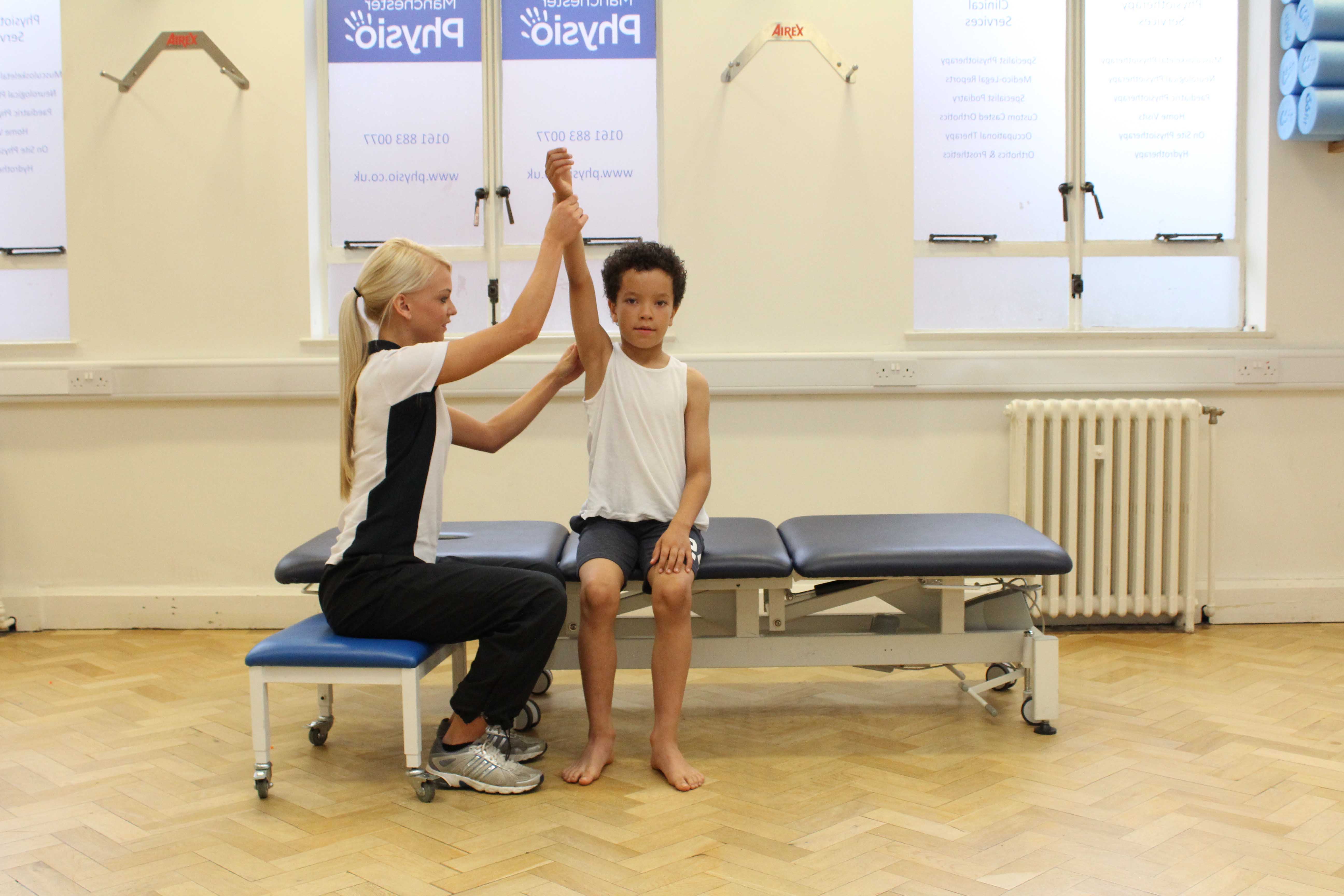What is Erb’s Palsy?
Erb’s Palsy can also be known as Brachial Plexus Paralysis. It is a condition that occurs in babies and is characterised by an abnormality in movement of an arm. Erb's Palsy is caused by damage to one or more of the five main nerves that supply movement and feeling to the arm. The damage is usually a result of birth trauma from a difficult delivery.
Erb’s Palsy affects approximately 1 in every 750 babies. Erb's Palsy will affect each baby differently. Paralysis (loss of movement) of the arm can be complete or partial. Some babies will recover on their own other will require physiotherapy intervention, and the more serious injuries may require surgery.
 Above: passive mobility and stretch exercises for the arm and shoulder performed by a paediatric neuro physiotherapist
Above: passive mobility and stretch exercises for the arm and shoulder performed by a paediatric neuro physiotherapistWhat causes Erb’s Palsy?
In Erb's Palsy one or more of the five main nerves, that supply the arm with sensation and movement, are either partially or completely paralysed. This usually occurs due to problems during the birth. Other conditions that may complicate brachial plexus injury and they include; fractures of the humerus / clavicle, cervical spine injury, other nerve palsies.
The main factors that affect how severe the injury are:
The number of nerves that have been affected
There are five nerves of the brachial plexus (the nerves that supply movement / sensation to the arm). Generally the more nerves that have been affected the more serious the injury is.
The extent of the nerve damage
The affected nerves can be damaged in four ways:
Avulsion: The nerve is torn from the spine; this is the most severe injury.
Rupture: When the nerves are torn partially or completely.
Neuroma: When a partially torn nerve has attempted to heal itself but scar tissue has formed putting pressure on the nerve.
Stretched: A nerve stretch / praxis injury is when the nerve has been stretched due to the pull of the neck and shoulder. Stretch injuries will recover well with a return of function in the arm over 90% in up to two years.
What are the symptoms of Erb’s Palsy?
Erb’s Palsy causes loss of sensation, weakness and reduced movement of the affected arm. Symptoms can present as a limp or paralysed hand with lack of muscle control and reduced sensitivity in the arm, hand or wrist. Babies with Erb's palsy tend to hold their affected arm down at their side rather than bent up against their body.
Each baby’s nervous system and injury are unique; therefore, each baby can be affected differently. The prognosis will depend on the extent of the injury.
What should I do if my child has Erb’s Palsy?
Early Intervention is crucial as getting treatment in the first months will have a significant impact on recovery.
Physiotherapy for Erb’s Palsy
Physiotherapy helps to maximise the range of movement, strength and function of the affected arm.
At Physio.co.uk the aims of physiotherapy for Erb’s Palsy are:
- To prevent / reduce stiffness in the affected arm
- To increase your baby’s awareness of their arm
- To increase the movement and strength of your baby’s affected arm.
- To advise you on how to look after your baby’s arm
- How to support your baby’s arm so that the arm is positioned comfortably
- How to hold the affected arm whilst dressing and washing
- How to touch and move the baby’s arm.
- How to move and stretch your baby’s arm to stop it becoming stiff
- How to position your baby to encourage movement and allow them to reach normal developmental milestones
Hands on physiotherapy may include:
- Gentle passive range of movement exercises to improve joint flexibility and increase muscle tone.
- Provide tactile stimulation to the affected arm
- To increase your baby's muscles strength and sensation weight bearing through the arm will be encouraged.
- Using the affected arm in a variety of developmentally appropriate activities to progressively increase the strength and coordination of the arm.
- Constraint therapy
- Hydrotherapy
Does Erb’s Palsy have any long-term effects?
Although movement recovers in many children less than one year old, children who still have restricted movement after one year old will rarely gain full function of their arm.
To arrange a physiotherapy appointment call Physio.co.uk on 0330 088 7800

 0330 088 7800
0330 088 7800


































